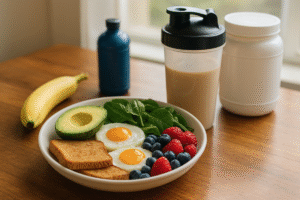Post Long Run Recovery Food: What to Eat After Big Miles
A long run feels amazing — until the hunger hits. Your legs ache, your stomach growls, and suddenly, you’d trade your medal for a sandwich. That’s where recovery food saves the day. Knowing what to eat after a long run helps your muscles rebuild, restores energy, and prepares you for the next challenge.
Therefore, let’s dig into the best post long run recovery food to help you bounce back faster, stronger, and happier.
1. Why Recovery Food Matters
After running, your muscles are tired, your glycogen stores are empty, and your body is slightly dehydrated. Because of this, refueling is essential. Eating the right food helps your body repair faster, reduces soreness, and improves your next workout.
According to experts, your body absorbs nutrients best within the first hour after exercise. Therefore, what you eat during that window can make a huge difference.
In other words, food is part of your training — not just something that happens after it.
2. The Golden Recovery Rule: Carbs + Protein
Every runner needs both carbohydrates and protein after a long run. Carbs refill your fuel tank, while protein repairs your muscles. For best results, aim for a 3:1 ratio of carbs to protein. (Strava: Recovery Tips)
Here are a few easy combinations to try:
-
Chocolate milk – a perfect ready-to-drink mix of carbs and protein.
-
Peanut butter on toast – energy and repair in one tasty bite.
-
Greek yogurt with fruit and honey – simple, quick, and delicious.
As a result, your body starts healing immediately and your energy levels recover much sooner.
3. Real Foods That Help You Recover
Whole foods do more than fill you up. They also provide vitamins, minerals, and antioxidants that speed up recovery naturally.
Bananas
Bananas are rich in carbs and potassium, which help prevent cramps. In addition, they’re portable, easy to digest, and cheap.
Eggs
Eggs deliver high-quality protein for rebuilding muscle fibers. Moreover, they’re full of healthy fats and amino acids.
Oats
Oats give you slow-release energy to stabilize blood sugar after running. For instance, try overnight oats with banana and honey.
Berries and Cherries
These colorful fruits reduce inflammation thanks to their antioxidants. Consequently, you’ll feel less sore the next day.
Sweet Potatoes
They’re loaded with complex carbs and vitamins that restore energy stores. Plus, they’re versatile and taste amazing roasted or mashed.
Leafy Greens
Spinach and kale add iron and magnesium, which improve recovery and endurance. As a bonus, they help oxygen flow through your muscles.
When you choose real foods consistently, your body recovers faster and stays stronger for your next session.
4. Hydration and Electrolytes Matter Too
Food alone isn’t enough. Long runs drain your fluids and electrolytes, so hydration is part of recovery.
Drink water soon after your run. However, don’t stop there — add electrolytes to replace sodium and potassium lost through sweat. A simple mix of water, fruit juice, and a pinch of salt can work wonders. (Nike: Running Recovery Tips)
Furthermore, if your run lasted more than 90 minutes or took place in the heat, continue drinking fluids throughout the day. In fact, full rehydration can take several hours.
5. Smart Supplements That Support Recovery
Sometimes real food isn’t enough — or you just can’t face cooking after 15 miles. In that case, supplements can fill the gaps.
Protein Powder
Quick, easy, and effective, protein powder can jump-start recovery. Mix it with milk or a banana for extra carbs.
Electrolyte Tablets
They’re useful when you need to replace minerals quickly without drinking gallons of sports drinks. Moreover, they’re travel-friendly and low in sugar.
Omega-3 Capsules
These reduce inflammation and help keep your joints healthy. As a result, you’ll recover faster and feel less stiff.
Collagen Supplements
When taken with vitamin C, collagen may support tendons and ligaments. While supplements are convenient, remember they should support good nutrition, not replace it.
6. Timing Makes a Difference
Timing is everything. Within the first 30–60 minutes after your run, start your recovery routine.
-
Rehydrate with water or electrolytes.
-
Eat a carb-and-protein combo snack.
-
Follow up with a balanced meal two hours later.
Spacing out your meals helps your body absorb nutrients more effectively. Consequently, you’ll feel stronger, lighter, and ready to run again tomorrow.
7. Simple Post-Run Meal Ideas
When hunger strikes, keep things simple, fresh, and nourishing.
-
Breakfast Burrito: Eggs, beans, spinach, and salsa in a tortilla for a fast refuel.
-
Smoothie Bowl: Greek yogurt, berries, banana, oats, and protein powder — refreshing and colorful.
-
Salmon and Rice Bowl: Packed with omega-3s, complex carbs, and vitamins for recovery.
-
Pasta with Chicken and Veg: Great for rebuilding glycogen while feeding tired muscles.
Additionally, all these meals are easy to prepare and easy to digest — a win-win after long miles.
8. What to Avoid After a Long Run
Not every food helps recovery. Heavy, fried meals and alcohol can delay muscle repair. They also slow digestion and make dehydration worse.
Instead, choose something light and nourishing. For example, reach for fruit or yogurt instead of doughnuts or crisps. This small change can make recovery smoother and quicker.
Also, limit caffeine right after running. It can dehydrate you when your body needs water most.
9. The Long Game: Fuel Smart, Recover Strong
Good recovery food isn’t a one-time fix — it’s a habit. When you eat well after every long run, you build resilience and strength over time. Consequently, your legs hurt less, your energy lasts longer, and your next run feels easier.
So remember: post long run recovery food isn’t just fuel — it’s your body’s repair kit.
Eat smart. Rest well. And run again tomorrow feeling stronger, lighter, and ready for more.
External Links
